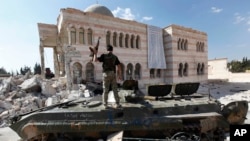In its assault against the Islamic State group this week, Turkey empowered an Arab rebel force that originally was formed to fight the Syrian regime, mainly in the city of Aleppo.
The offensive against the IS-controlled town of Jarablus included at least 10 rebel factions that have been involved in different battles against President Bashar al-Assad’s forces since the war in Syria broke out in 2012.
The factions are loosely known as the Free Syrian Army (FSA), which began as a secular force mainly composed of soldiers who had defected from the Syrian military.
“These are a combination of Sunni Arab and Turkmen groups that have been entirely supported by Turkey,” said Mustafa Abdi, a Syrian media activist who closely followed the Jarablus offensive.
The 1,500 rebels in the assaults included those from the al-Sham Legion, Levant Front, Nureddine al-Zanki Battalions, Jaish al-Tahrir and Ahrar al-Sham — Islamist groups that have fought under the umbrella FSA.
Competing forces
The battle against IS in northern Syria involves a complex array of competing forces, some of which have U.S. support.
The operation to liberate Jarablus from IS fighters came less than two weeks after the U.S.-backed and Kurdish-dominated Syrian Democratic Forces liberated the town of Manbij, another IS stronghold in the vicinity.
The Kurdish rebels have been a source of tension between the U.S., which views them as a key ally in the war in Syria, and Turkey, which sees them as terrorists allied with separatist Turkish Kurdish factions inside Turkey.
Fearing a Syrian Kurdish-led offensive on Jarablus, Turkey mobilized the rebels.
Sources told VOA that the operation was put together in less than 12 days and that rebels were taking instructions from the Turkish military. Turkish tanks led the way and were backed by U.S. bombers.
Kurdish forces retreated from the area, reportedly at the urging of U.S. officials. By Thursday, Kurdish forces had moved to their bases east of the Euphrates River, leaving Turkish forces and rebels to control the area around Jarablus.
“These Turkey-backed groups were deployed to the battle to push out IS and stop Kurdish advances at the same time,” said Rami Abdulrahman, head of the Britain-based Syrian Observatory for Human Rights, an anti-Assad group.
IS fighters gone
Most IS fighters had fled south to IS strongholds even before the Turkish operation reached the town.
There were small-scale confrontations between Syrian rebels and IS fighters, “with IS knowing that Turkey was there to win,” Abdulrahman said.
Turkish news reports said 46 IS fighters and two FSA fighters were killed.
The Turkish-backed FSA fighters are expected to move farther south into IS territory. They have announced plans to take control of the IS-held town of al-Bab.
“They have the capability to go after IS in the area,” Abdulrahman said, adding that they were fully trained by the Turks.
Rebel fighters reportedly were engaged in low-key clashes with Kurdish forces in southeastern Jarablus on Thursday. At some point, analysts say, Syrian rebel forces could confront Kurdish fighters.
“The Kurds lost hundreds of fighters in the Manbij [battle]. It would be difficult for them to withdraw after gaining all these vast territories from IS,” Abdulrahman said.
Kurdish forces said they were intent on protecting their territories.
“Regardless of what happens in Jarablus and elsewhere, Kurdish forces would continue defending our territories whether from IS, opposition groups or Assad military,” said Alan Shammo, a Kurdish official in northern Syria.
VOA's Kasim Cindemir contributed to this story from Washington





